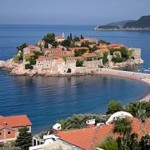 (Podgorica, 5 February 2012) – MANS today posted on its website documentation relating to illegal construction by the Adriatic Properties company, as well as the annex of the agreement that extends the deadline for completing renovations in Sveti Stefan by 15 June 2011 (www.mans.co.me).
(Podgorica, 5 February 2012) – MANS today posted on its website documentation relating to illegal construction by the Adriatic Properties company, as well as the annex of the agreement that extends the deadline for completing renovations in Sveti Stefan by 15 June 2011 (www.mans.co.me).
Persistent attempts to cast blame elsewhere and manipulate the public cannot hide the truth that representatives of the Restis Group in Montenegro have committed a crime under Article 326a of the Criminal Law of Montenegro – the building of an object without a building permit, which is punishable by a prison sentence ranging from six months to three years in jail. In the documentation that MANS submitted to the prosecutor, and which has been posted to our website, it is clear that the representatives of Adriatic Properties ignored the explicit order barring further construction. As a result, the relevant authorities took a decision to demolish the two illegally built objects on site.
In essence, on 9 March 2010, the relevant inspectorate found that Adriatic Properties was carrying out works without previously secured building permits and then banned the carrying out of further works. In the following two inspections that were carried out on 20 March and 9 April 2010, the inspectorate established that further works were not being undertaken. However, during an extraordinary inspection on 10 May 2010, the inspectorate discovered that work on the objects in question was being continued in spite of the ban on further building. The same day the inspectorate adopted a decision ordering the demolition of the buildings that Adriatic Properties had been building, which has yet to be implemented to this day.
Regardless of the fact that the Municipality of Budva bent over backwards to retroactively legalize these objects, the fact remains that Adriatic Properties representatives committed a crime for which they still have to answer. In this sense the anxiety of the Restis Group representatives is understandable. Their claims about how much they care about Montenegro’s citizens are hard to swallow, nor can anyone produce evidence that the company is investing in Montenegro out of philanthropic goodwill. Seeking profit is definitely a legitimate investment motive, but not at the cost of violating the law and committing criminal acts. In so far as some people from the Restis group were promised such business conditions, it would be good to hear who made such promises.
The information that MANS has obtained and that was submitted to the prosecutor indicate that the Restis Group’s Montenegrin interlocutors may have been former ministers Predrag Nenzić and Branimir Gvozdenović, as well as the current Minister of Tourism Predrag Sekulić (who were responsible for protecting the public interest and ensuring that investors respect their contractual obligations and the law).
As far as respecting established deadlines, MANS released today the annexes to the agreement which explicitly outlined changes in the main agreement. One of these relates to a final deadline of 15 June 2011 for the completion of all renovation work on Sveti Stefan. The initial deadline was 30 June 2008, which is the deadline that Aman had initially broken without any sanction. After Aman’s lease was taken over by Restis, we got an even worse investor, who not only violated deadlines stipulated on the lease but also engaged in illegal construction.
The Government of Montenegro and the Restis Group are currently negotiating an extension of the lease and are reducing their yearly rents, which means that the Restis Group is trying stir up controversy in order to create a better bargaining position for itself during negotiations. Similarly, the unsuccessful attempt to prove that there was no violation of the law in Sveti Stefan and that even if there was it was out of love for Montenegro, Restis is obviously trying to protect those same individuals who had protected them all these years and permitted them to continuously violate the laws and regulations of this country.
As for the Berane Coal Mines and Restis’ offer that the state take the mine over again for 1 euro, there is no doubt that this would be an easy exit for the Restis Group and their company “Balkan Energy.” Restis won the tender since it was apparently the best choice for revitalizing the mine, which should have created new jobs and modernized the premises. Now that same company is being offered up for 1 euro, which is a sufficient commentary on what kind of strategic partner we’ve managed to attract.
Montenegro needs investments, but not investment at any price. We don’t need investments that require the violation of laws and regulations in order to be realized or which require corrupt ministers and officials who are ready to close their eyes in the interest of investors.
Unfortunately, there are many other examples that confirm our suspicions that the Government of Montenegro created a business environment in which the violation of agreements without sanction is a regular appearance, while illegal construction is still a profitable means of realizing profits.



